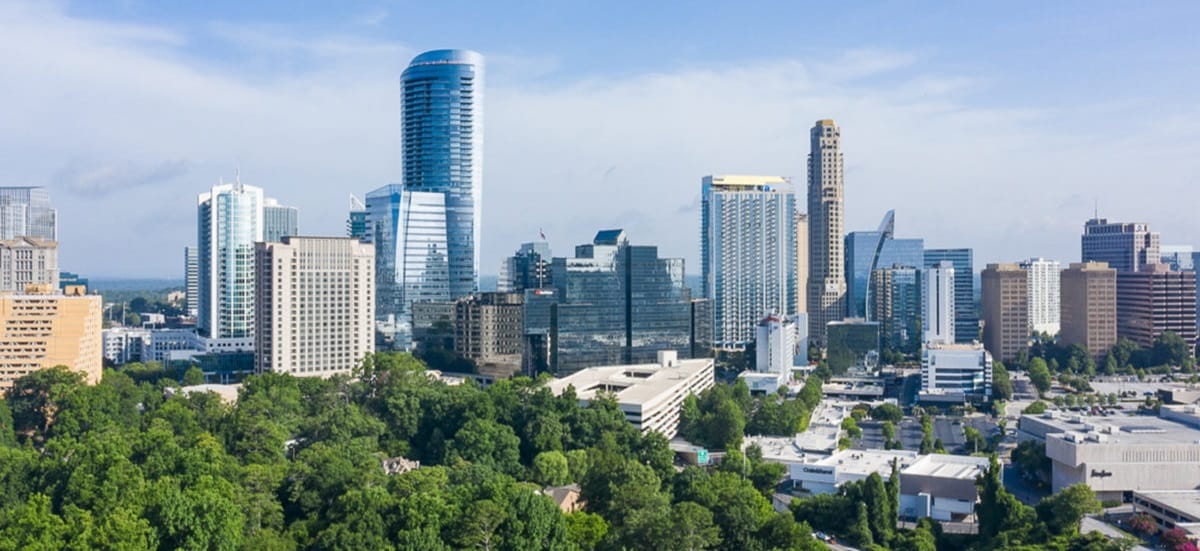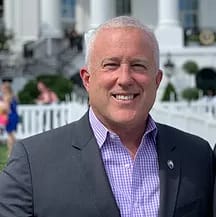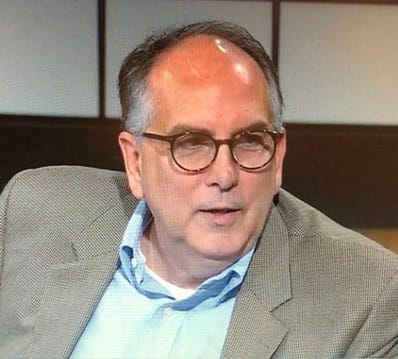About 61% of Buckhead voters support holding a vote on the question of separate cityhood for the neighborhood, according to an internal poll conducted for an advocacy group by a firm run by its lobbyist.
Cityhood backers say the poll shows their political momentum, while anti-cityhood advocates say it failed to ask about challenging issues. The results show a strong partisan divide on the debate, with a heavy majority of Republicans supporting a cityhood vote and a plurality of Democrats opposed.
The July poll of 1,315 registered local voters did not ask whether they support the actual creation of Buckhead City. It did ask about the crime and racial issues that are considered political strengths and weaknesses of the debate, and also sought opinions about the current mayor and two of the candidates to replace her. A public report on the results, released this month, bumped up the percentages on some key findings by over 1%, which pollster/lobbyist John Garst said were rounding errors that will be corrected after Buckhead.com pointed them out.
Bill White, CEO and chairman of the Buckhead City Committee, says the poll did not ask an opinion on cityhood itself because of the current step in the political process, which involves completing a feasibility study and asking the General Assembly to approve a Buckhead-only ballot question.
“First things first,” said White in a written statement. “The goal now is to get the issue onto the Nov[ember] 2022 ballot. That’s what our representatives in the Georgia General Assembly need to hear.”
To the BCC, the poll results show the political momentum it’s looking for: not only the support for a vote, but also nearly 65% of respondents citing crime as their top local concern, an issue that is driving the cityhood messaging. White also pointed to a result showing about 62% of voters saying they would be more likely to support legislators who back a cityhood vote.
However, there are stark partisan differences in the results on the questions about the cityhood vote and legislator support. Republican respondents were strongly in favor, around 86% for the vote and 84% saying it would sway their support for legislators. Democrats were a different story, with only around 38% supporting the cityhood vote and a 48.3% plurality opposed with about 13% holding no opinion. Democrats had a similar split on support for pro-vote legislators, with only around 44% more likely to support legislative backers. (Around 62% of independents favored a cityhood vote.) Buckhead’s state legislators are currently Democrats and the cityhood legislation’s sponsors are Republicans from North Fulton and Forsyth County.
Meanwhile, an anti-cityhood group called the Committee for a United Atlanta is downplaying the poll. CUA co-founder Edward Lindsey says the main purpose of releasing the poll “was for you to write a story” and publicize the cityhood effort. “In terms of what it actually tells us, it doesn’t really tell us much of anything besides what folks already know. It doesn’t advance the debate, let’s put it that way, one way or the other.”
Everyone already agrees that crime is a problem, Lindsey noted; the question is how to solve it and whether cityhood is the best way. He said the poll’s questions avoided delving into challenges of cityhood, like taxes, public schools and the financial impact on Atlanta. “Note very carefully what they ask and what they don’t ask. They don’t actually ask about how people feel about a Buckhead City,” he said.
White said that Lindsey is wrong about the poll’s usefulness. “Our poll told us several new things: Buckhead residents reject the so-called United Atlanta group’s making this about race and indeed it told us Buckhead residents will hold legislators accountable when considering to allow them the right to vote their own destiny on Buckhead City,” he said.
White was referring to a question addressing racial discussions about cityhood that the backers have been keenly aware of from the start last year, raising it themselves in early forums. The fundamental issue is a wealthy, majority-White community separating from a Black-led city in an era of racial justice protests. The poll asked if “it’s fair or unfair for people to be labeled ‘racist’ for trying to get control of crime in any community?” Nearly 74% of respondents said it’s unfair, an answer the BCC and Garst present broadly as a condemnation of “name-calling” and discussing race in the cityhood debate.
Asked who has claimed that crime-fighting efforts are racist, White said, “It’s a recurring theme both in media coverage and on social platforms,” and included a link to a recent column by the Atlanta Journal-Constitution’s Bill Torpy that called race an “undercurrent” to the debate. The column cited White’s appearance on Tucker Carlson’s Fox News show where the discussion of specific local crimes highlighted ones with Black perpetrators and White victims. The CUA also cites the “racial implications” of cityhood as a negative in its publicity materials. However, neither Torpy nor the CUA called anyone “racist” and both express agreement with crime-fighting efforts.
“I don’t know where they’re coming from with that. I don’t know who that question was designed to respond to,” Lindsey said of the poll question about “racist” labeling. “We consider attacking the concerns on crime to be something that’s universal. We don’t believe that someone jogging down West Wesley [Road] should feel a threat of violence. We also don’t believe a child in a back seat of a car on Bankhead Highway, [or] her parents, should have a fear of a threat of violence.”
The BCC is noting that the poll showed nearly 60% of Black and African American respondents cited “crime/public safety” as their top concern.
The poll was conducted by Rosetta Stone Communications, an experienced firm that sometimes is commissioned by media outlets. Garst, the firm’s owner, is a registered lobbyist for the BCC and has done similar work for other cityhood movements, recently including Brookhaven and East Cobb and the controversial failed Eagles Landing effort in Stockbridge, which shares political similarities to the Buckhead City debate.
Conducted July 13-16, the poll targeted Buckhead registered voters by automated phone, live cell phone, operator dials and “digital channels,” according to the BCC. The margin of error is reported as 2.7% with a confidence rating of 95%. White says the BCC was the only funder and paid an “industry-standard fee” he declined to specify.
The abstracted version of the results, including a series of charts, included the slightly bumped-up percentages on several topics, including the cityhood vote, crime as a top concern, and the “racist” labeling. Garst said through a spokesperson that the percentages are commonly rounded for such presentations and were done incorrectly in this case.
“We rounded a couple of stats in the wrong direction,” he said. “It was a keen eye that noticed this discrepancy. Because you alerted us to this inaccuracy, we will make adjustments on the display of the poll results on our website this week.” He said that besides those “minor adjustments,” the poll itself is accurate.
One quirk of the poll was a question — numbered 13 — that was deleted from the results. The BCC would not give the text of that question, saying only, “It was not pertinent to the Buckhead City movement.”
White said the BCC intends to continue conducting polls and also expects to release its feasibility study in September. Lindsey said the CUA is not conducting polls.
Other takeaway results
The following are some other takeaways from the poll:
- Around 64% of respondents agree that Atlanta Police Department feels “demoralized and underappreciated by the current City leadership.”
- While crime and public safety were the top concern of respondents across the board from a slate of choices, there were significant partisan differences in the percentages. It was the top choice of about 83% of Republicans, about 64% of independents, and about 54% of Democrats. For those non-GOP voters, the second choice attracting more of their attention was “roads/infrastructure.” And for over 11% of Democrats, “social justice issues” were the top concern.
- The poll has three questions asking about current Mayor Keisha Lance Bottoms, who is not running for reelection, and two of the 14 candidates to replace her: City Council President Felicia Moore and former Mayor Kasim Reed. White says the questions were included out of curiosity to see who gets blamed for low APD staffing and morale. “As we fielded the poll in July, we wondered how many Buckhead voters held the current mayor responsible for doing such a poor job, and how many do not trust Reed to do a better job,” he said.
The results showed about 57% of respondents had a negative opinion of Reed, while a plurality of around 43% had no opinion about Moore and around 34% favorable. Bottoms had a 55% unfavorable job-performance rating overall, but with a significant racial difference: nearly 62% of White respondents viewed her unfavorably while over 54% of Black or African American respondents viewed her favorably. However, Bottoms, a Democrat, did not draw a favorable rating from any political alignment, with about 49% of fellow Democrats viewing her favorably compared to about 23% of independents and about 6% of Republicans.







